Government refuses to sack Southern Rail operator
Ongoing industrial dispute has cost the taxpayer £38m, Department for Transport reveals
A free daily email with the biggest news stories of the day – and the best features from TheWeek.com
You are now subscribed
Your newsletter sign-up was successful
Southern Rail's long-running industrial dispute has not only hit local house prices and caused untold misery to millions of commuters, but cost the taxpayer a mammoth £38m, it was revealed yesterday.
Despite the network's failings – it is rated the worst rail franchise in the country by far – ministers have refused to sack operator Govia Thameslink Railway (GTR), which is majority owned by the Go-Ahead group, says The Times.
In its response to a critical report from the parliamentary transport committee, the Department for Transport (DfT) committed itself to not revoking the contract, which is due to run until 2021.
The Week
Escape your echo chamber. Get the facts behind the news, plus analysis from multiple perspectives.

Sign up for The Week's Free Newsletters
From our morning news briefing to a weekly Good News Newsletter, get the best of The Week delivered directly to your inbox.
From our morning news briefing to a weekly Good News Newsletter, get the best of The Week delivered directly to your inbox.
The stance "disappointed" MPs on the committee, who criticised the handling of the operator. They want to know how Govia "was not in breach of its contract".
Transport ministers would be entitled to sack the network if it was deemed to be in breach of targets for punctuality and reliability, but Govia claims "force majeure" and insists industrial action is outside its control.
According to the latest reports, the DfT was thinking of sacking Govia but now says "taking the franchise away from GTR would only create uncertainty and cause further disruption".
It also confirmed that compensation for passengers relating to the strike action has cost £38m. Under the terms of Govia's deal, it is not responsible for picking up the tab.
A free daily email with the biggest news stories of the day – and the best features from TheWeek.com
The dispute has not yet ended as union members have rejected a succession of deals, but Southern insists the impact on passengers is now "minimal", says the BBC.
Southern rail boss: 'We aren't doing anything wrong'
28 February
The chief executive of the company running Southern rail says they "aren't doing anything wrong".
David Brown, the boss of Go-Ahead Group, which owns two-thirds of Southern's operator Govia Thameslink Railway, laid the blame for the problems suffered by travellers on rolling strikes over the past year over the proposed introduction of driver-only services.
He told The Guardian: "We're doing this because it's the right thing for the railways, for taxpayers – we aren't doing anything wrong… It was not unreasonable to assume we'd get this through."
While Brown admitted the firm could have done things differently – "in terms of staff engagement, absolutely" - but said it needed to change the railway and ways of working.
He also highlighted the investments Southern has made in an attempt to show how the company is acting in the interests of consumers.
He said: "We've introduced more trains than any other franchise in the UK, we've got the largest driver recruitment school in Europe… and we're the first train operator to introduce delay repay [compensation] at 15 minutes."
Patrick Butcher, the chief financial officer of Go-Ahead, said Govia had made a loss of about £4m during the first six months of its financial year and could lose as much as £15m over the year.
He added: "We won't make money on this contract until we start running trains reliably."
Southern has been voted the worst rail franchise in the country; in January, less than half of its services arrived on time.
However, the company said the travel woes will continue as unions continue their fight, with a compromise agreement rejected by members of the conductors' union Aslef this month.
Brown would only "guarantee" that services would be "much improved" by the end of 2018, when "London Bridge infrastructure is finished and the last timetable change is in place", says the London Evening Standard.
Go-Ahead shares had slumped 13 per cent to £19.87 by 3pm today.
Southern commuters braced for further strike misery
17 February
Southern rail passengers may face further strike misery after the drivers' union Aslef rejected a deal on diver-only trains.
Union members voted by a margin of 54 to 46 per cent against the proposed agreement, which offered limited assurances on rostering a second, safety-trained crew member in return for accepting Southern's plans for more driver-only operation.
Many were angry over the terms of the deal including concessions on the key principle that a train could, in certain circumstances, run with only a driver on board.
"Drivers had lost significant pay through a series of strikes," says The Guardian, so "Aslef believed most would accept the deal its leadership had recommended".
Mick Whelan, general secretary of Aslef, said: "We understand and support the decision arrived at democratically by our members and will now work to deliver a resolution in line with their expectations."
The decision could lead to a new round of strikes.
Southern commuters are already facing the prospect of a transport misery next week. The RMT union, which represents conductors, held separate talks with Southern managers earlier this week and its members have already scheduled another walkout for 22 February.
However, it is Aslef's rolling walkouts over the past year that have had the most detrimental impact on a rail franchise that was last month voted the worst in the UK.
In January, less than half of Southern trains arrived on time and there is evidence that commuters along the route are seeing their house prices fall and employment prospects suffer as a direct result.
It was even reported last month that the government was considering re-nationalising the route on a temporary basis.
At the centre of the dispute is Southern's move to increase the number of trains running without a conductor, which would cost jobs and which unions say is not safe.
Around 40 per cent of commuter trains across the UK already run without a conductor, including many on Southern's sister service Thameslink, while the Rail Safety and Standards Board say driver-only trains pose no safety risk.
Southern rail and Aslef reach deal to end strikes
3 February
Southern rail and train drivers' union Aslef have reached a deal to end the year-long strike action that has brought travel chaos to southern England.
The two sides have been in dispute over plans to increase the number driver-only trains, but following weeks of "intensive" negotiations, TUC general secretary Frances O'Grady announced the union and Govia Thameslink Railway (GTR), which owns Southern, had reached an agreement.
While no details are expected before the deal is put to Aslef members next week, it is hoped the breakthrough will end the travel misery suffered by 300,000 commuters a day over the last ten months.GRT has been at loggerheads with the union over plans to remove guards from trains, which would lead to job losses among conductors. Aslef said this would compromise passenger safety.
However, the operator, along with the industry regulator the Rail Safety and Standards Board, argued driver-only operation was common practice on much of the rail network, including on Southern's sister service, Thameslink.
Around 40 per cent of trains across Britain are run without a conductor, with the driver responsible for opening and closing the doors.
The London Evening Standard says that "as part of the deal there will be much closer liaison between the union and management over any changes – which will in future only be by agreement".
Aslef general secretary Mick Whelen said: "Aslef has never been against changes to working methods. Rather, we believe any changes should be negotiated through agreed procedures."
GTR is still in dispute with the RMT union, which represents conductors, although its strikes, which have been ongoing since last April, have "had a comparatively limited effect on the running of the service", says The Guardian.
Last week, a national rail passenger survey confirmed Southern was the worst-performing train operator, while there have been reports that employers are reluctant to take on new staff if they rely on Southern to commute.
In addition, house prices along the network's routes "are two to three per cent lower than elsewhere because of continued poor and unreliable rail service", says the Evening Standard.
Commuters this week launched a legal attempt to force the government to take action over the failing train service, with reports suggesting some or all of the Southern network could be temporarily nationalised.
Southern rail franchise 'could be renationalised'
26 January
Southern rail could be renationalised under radical plans being considered by the government, says The Times.
After two years of commuter misery, including a year of "chaos" from ongoing strike action that has seen less than half of scheduled services arrive on time in the past month, ministers are "exploring options" to sort out the network.
Proposals include taking Southern into public hands "until another private operator can be found", something that last happened in 2009, with the temporary nationalisation of the East Coast Main Line.
The government is also examining splitting Southern from owners Govia Thameslink Railway (GTR) to operate as an independent entity "as part of a 'managed exit' until a new contract can be arranged".
GTR is the country's largest rail franchise and runs around a fifth of all commuter trains on the national network. It is owned by Govia, a joint venture between Go-Ahead and Keolis which also operates the Southeastern and London Midland franchises.
A national survey saw Southern named the UK's worst rail operator this week, with only 66 per cent of passengers satisfied with their last journey, a fall of two per cent from last year.
Transport ministers would be entitled to sack the network if it is deemed to be in breached of its contract, which sets targets for punctuality and reliability.
Since last year the government has been examining whether Southern's performance constitutes such a breach, or whether it agrees with the company's claim of "force majeure" because of the ongoing industrial action, says The Guardian.
Both Aslef and the RMT have staged rolling, coordinated walkouts over the operator's plans to increase the number of driver-only trains.
Union bosses have been accused of politicising the issue as 40 per cent of trains in Britain already operate with guards. This could have a bearing on the Conservative government's decision.
"The Department for Transport has been reluctant to strip the company of the contract for fear of playing into the hands of unions," says the Times.
The transport department said last night that there were "no plans to strip GTR of the franchise".
Southern train cancellations 'could affect house prices'
5 July
Disruption to commuter trains between Brighton and London on Southern rail is so bad it could cause house prices to fall, property experts warn.
Bosses at Southern's parent company, Govia Thameslink Railway (GTR), will today defend their decision to cut some services temporarily in front of the transport select committee of cross-party MPs.
GTR has already dropped 250 services a day and this is expected to extend to 350 under a new emergency timetable.
Southern provides around 165 million passenger journeys every year, from the capital to Brighton and other towns on the south coast, as well as Gatwick Airport. The premium Gatwick Express is among the affected services.
The company says the cancellations have been forced on it by strike action and a high level of staff sickness.
However, the RMT union says the cancellations have nothing to do with sickness but are the result of "gross mismanagement" by a company that is "protected by, and in cahoots with, the government".
General secretary Mick Cash says Southern is trying to blame the frontline staff for a crisis that is of its own making.
Strikes have already taken place over the decision to bring in driver-only trains, ditching the old system of having one employee to drive and another to open the doors and ensure passenger safety.
RMT says this will mean job losses – something Southern denies – and that it compromises the safety of passengers.
Labour and the Greens have called for the company to be stripped of the franchise, but rail minister Claire Perry has defended the firm, saying it was right to implement the changes and cut the timetable.
According to the Daily Telegraph, the long-running disruption is so severe it could start to lower the cost of property in Brighton, Lewes and elsewhere.
One property expert told the paper that buyers might consider Warwick or Leamington Spa as alternatives when looking to buy outside London.
The commute to both towns is longer, but the houses are cheaper and, crucially, the train service is more reliable.
Why is Southern rail so bad?
22 June
"Southern" now features in Twitter's rush-hour trending topics with the regularity of a clock, with hundreds of commuters expressing their frustration at delays, cancellations and rampant overcrowding.
Up to 90 trains per day have been cancelled over the past few months, The Guardian reports, leaving customers scrambling to board packed trains or search for alternative routes.
London Mayor Sadiq Khan has also weighed in on the "appalling" service, calling for the control of suburban rail lines to be transferred to Transport for London to end the "suffering" of passengers.
So why does Southern appear to be falling apart at the seams?
Staff sickness
Many customers have been left baffled by Southern repeatedly blaming service disruption to "staff sickness".
Insiders claim the phrase is a euphemism for unofficial strikes connected to a prolonged and bitter dispute with the Rail and Maritime Transport (RMT) union.
Southern employees have staged four walkouts over plans by Govia Thameslink Railway (GTR) to switch to driver-operated doors. Union members claim this practice would be unsafe, as well as a threat to the jobs of the nearly 500 conductors who currently perform the function, something GTR denies.
Chief executive Charles Horton says that some of the 39 conductors who call in sick every day on average are doing so deliberately as "unofficial industrial action."
He told the Sunday Times there was "pretty compelling" evidence to support this conclusion, including the fact that sickness rates had increased by 40 per cent over the last month.
However, RMT claims the "sick note strike" narrative is a smokescreen for the real cause of service disruption: poor management and understaffing.
Staff shortages
Regular Southern travellers will be well acquainted with delays caused by "waiting for a driver" or "crew shortages". Why has the franchise apparently been left in the lurch?
"The trouble is that their roster system relies on overtime," writes journalist and author David Boyle. "Without overtime, they can’t run the train service that people rely on."
According to several employees, GTR has imposed a ban on "rest day working" – overtime – and forbidden workers from swapping shifts.
Brighton and Hove News published a letter sent in by an anonymous Southern worker, who received it from their manager, which appears to confirm that "rest day working" is no longer being authorised.
This, combined with accusations the company has failed to recruit sufficient numbers to operate routes, apparently explains the chronic staffing problem that continues to plague services.
Southern initially denied an overtime ban was in place, but later admitted this had been the case and that it had been lifted. Whether this will be enough to keep commuters' misery at bay until the industrial dispute has been resolved remains to be seen.
-
 Why is the Trump administration talking about ‘Western civilization’?
Why is the Trump administration talking about ‘Western civilization’?Talking Points Rubio says Europe, US bonded by religion and ancestry
-
 Quentin Deranque: a student’s death energizes the French far right
Quentin Deranque: a student’s death energizes the French far rightIN THE SPOTLIGHT Reactions to the violent killing of an ultraconservative activist offer a glimpse at the culture wars roiling France ahead of next year’s elections
-
 Secured vs. unsecured loans: how do they differ and which is better?
Secured vs. unsecured loans: how do they differ and which is better?the explainer They are distinguished by the level of risk and the inclusion of collateral
-
 Ski town strikers fight rising cost of living
Ski town strikers fight rising cost of livingThe Explainer Telluride is the latest ski resort experiencing a patroller strike
-
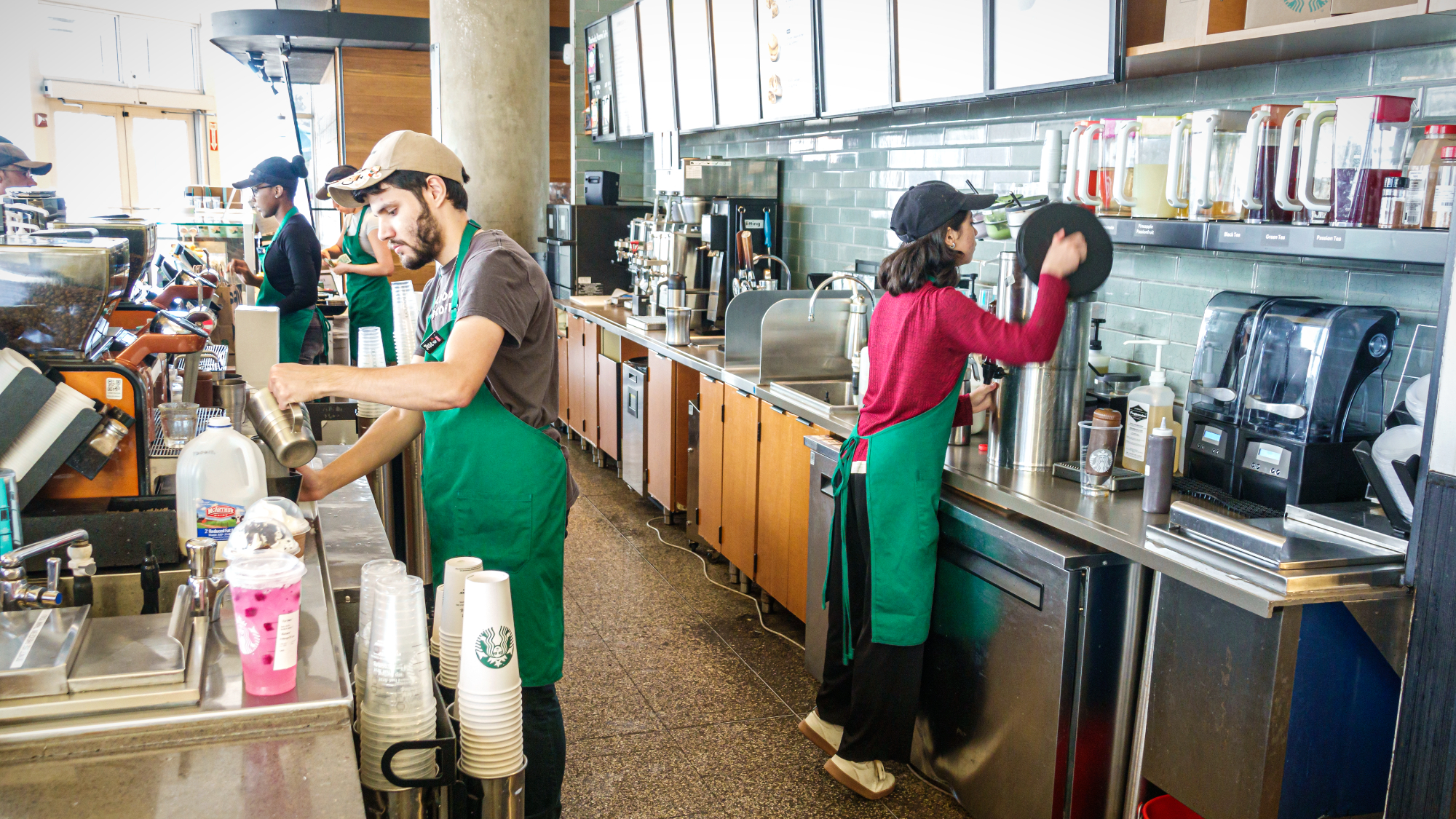 Starbucks baristas strike over dress code
Starbucks baristas strike over dress codespeed read The new uniform 'puts the burden on baristas' to buy new clothes, said a Starbucks Workers United union delegate
-
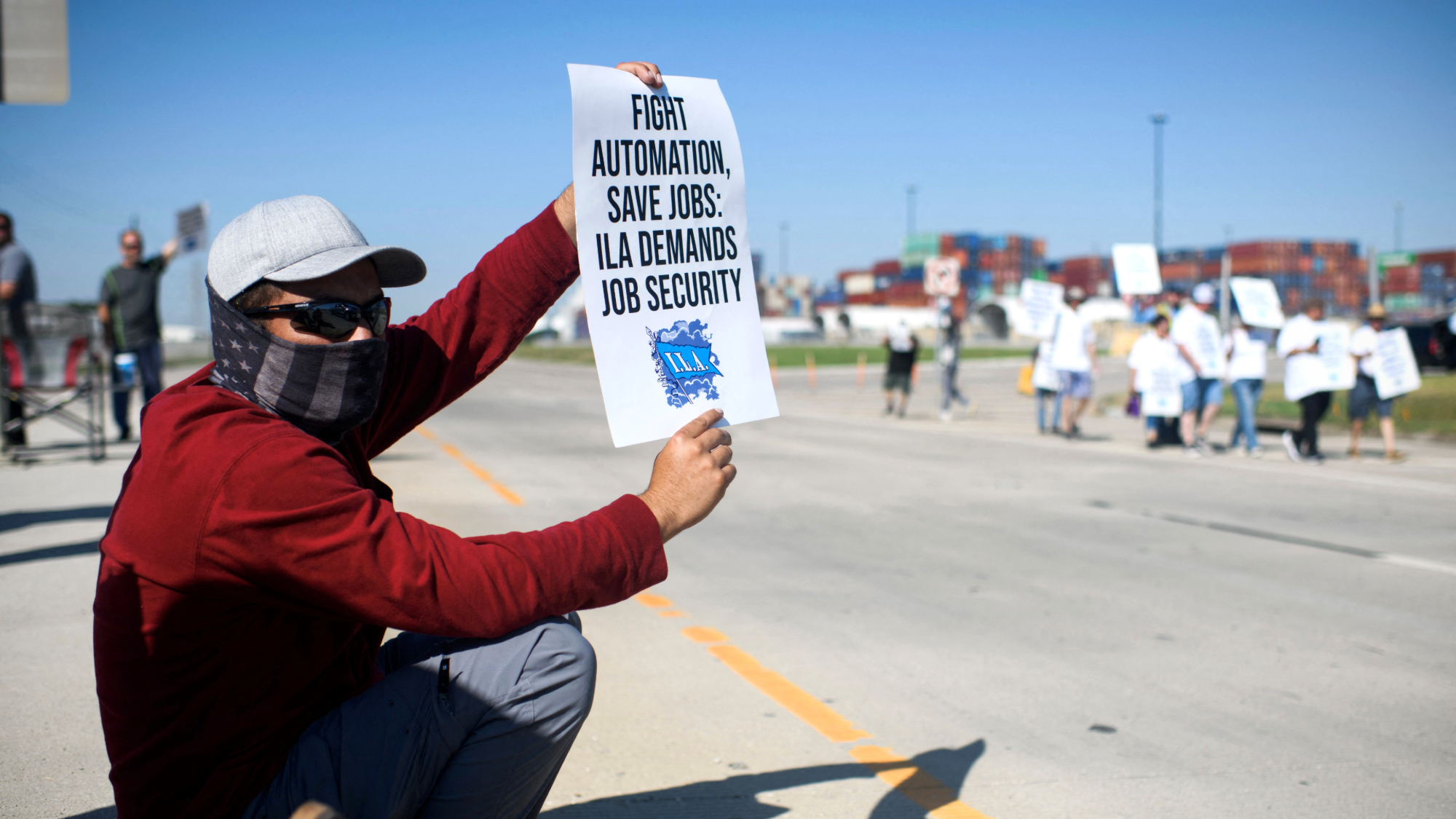 US port strike averted with tentative labor deal
US port strike averted with tentative labor dealSpeed Read The strike could have shut down major ports from Texas to Maine
-
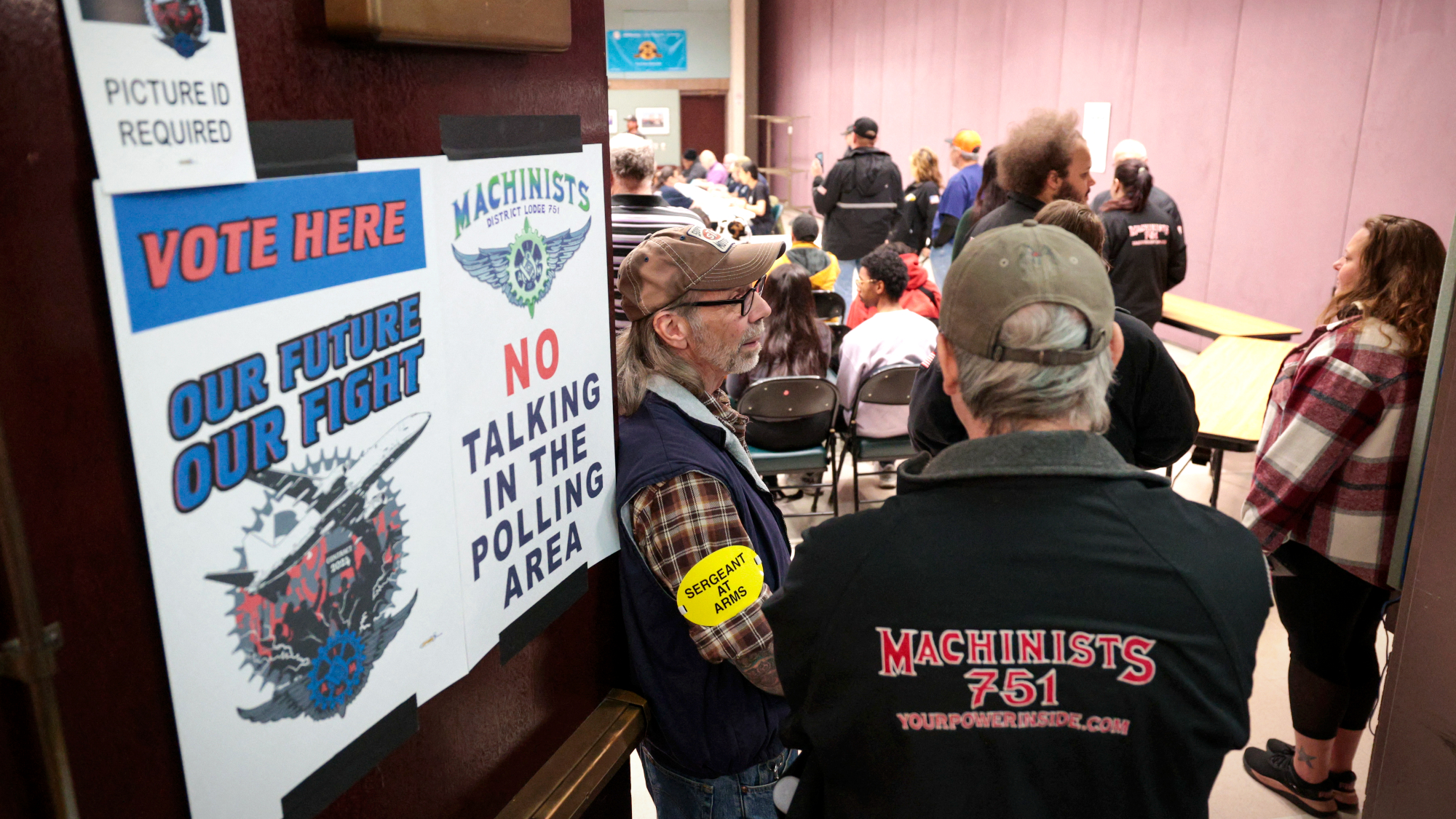 Boeing machinists approve contract, end strike
Boeing machinists approve contract, end strikeSpeed Read The company's largest union approved the new contract offer, ending a seven-week strike
-
 Boeing machinists reject deal, continue strike
Boeing machinists reject deal, continue strikeSpeed Read The rejection came the same day Boeing reported a $6.2 billion quarterly loss
-
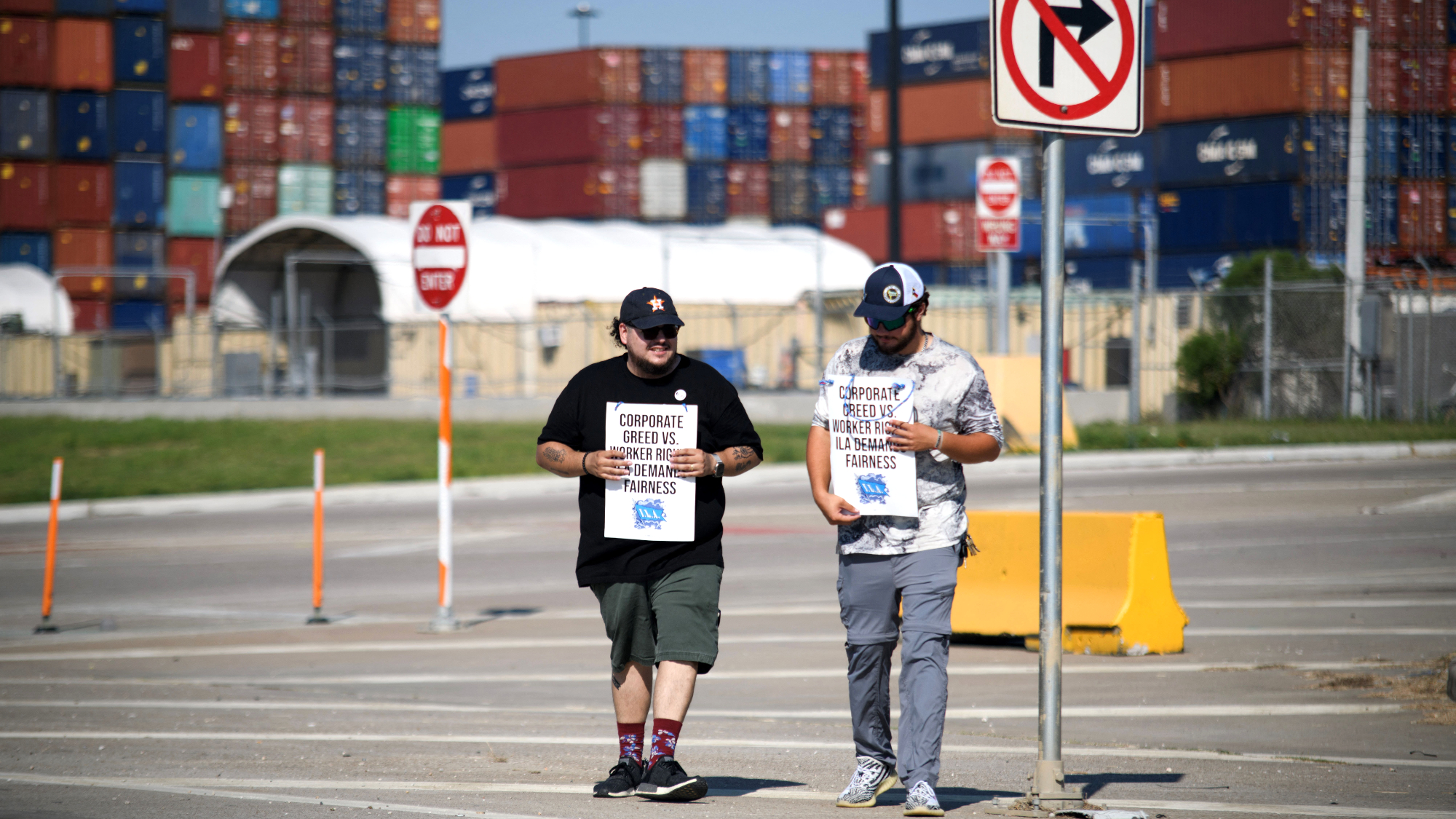 Ports reopen after dockworkers halt strike
Ports reopen after dockworkers halt strikeSpeed Read The 36 ports that closed this week, from Maine to Texas, will start reopening today
-
 Dockworkers strike, shutting eastern ports
Dockworkers strike, shutting eastern portsSpeed Read Approximately 50,000 ILA union longshoremen went on strike after failing to reach an agreement on a new contract with maritime companies
-
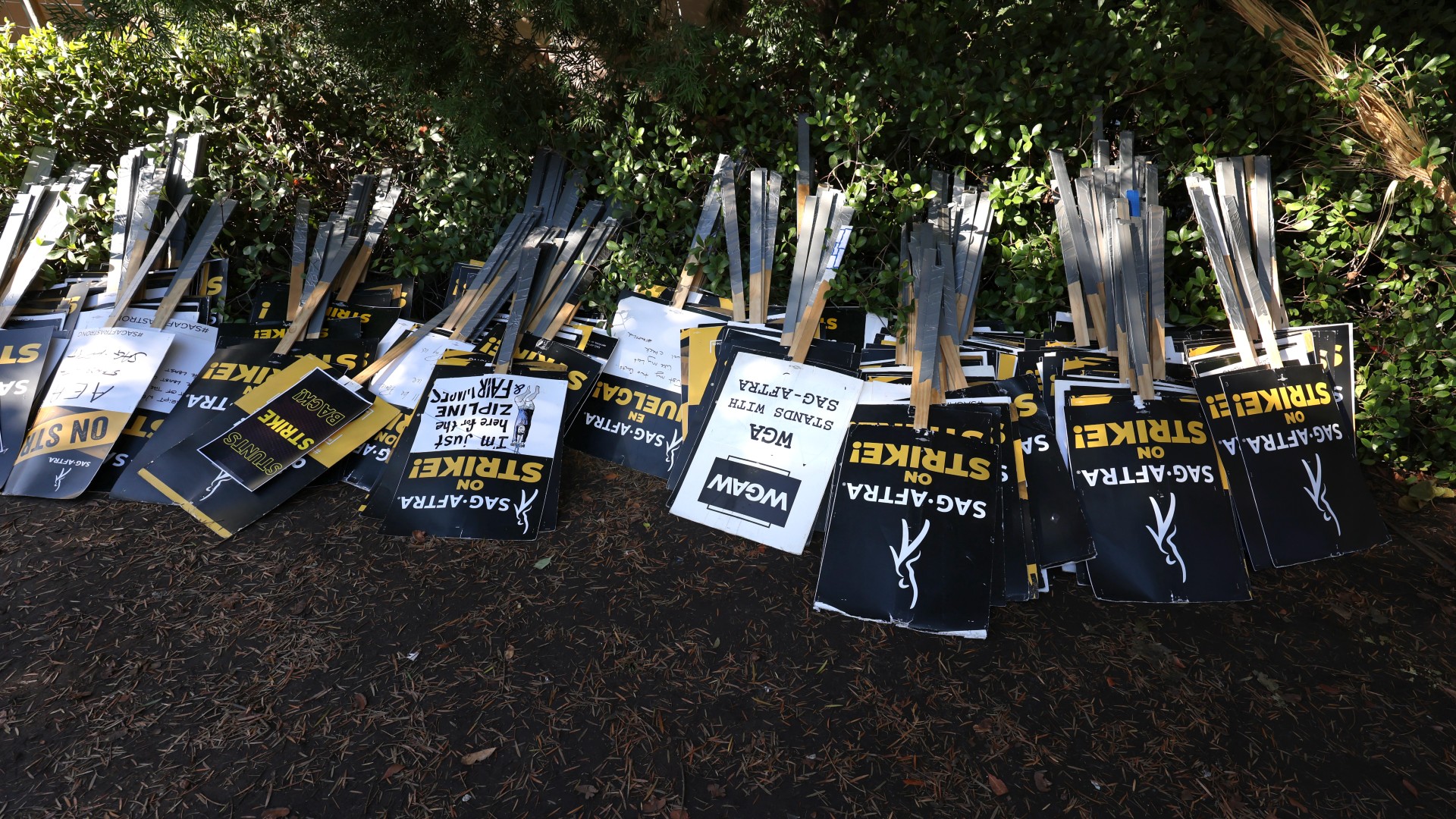 Video game performers to strike over AI concerns
Video game performers to strike over AI concernsSpeed Read SAG-AFTRA members are unhappy with gaming production companies